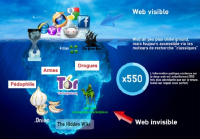
The truth is more nuanced. Cook is seeking a technological solution, something that scales, against what he sees as a human problem. Passing along lies may be “your prerogative” but it is the medium’s responsibility to slow the spread of lies and take action against persistent liars.
This is a hard truth the Internet industry is just waking up to, in the Age of Trump.
CrossCheck, a system for flagging fake news in France, which holds a Presidential election this spring, is Version 1 of the emerging solution. It’s important to note, however, that it’s just Version 1. Leading companies must undertake an open source process before a real solution can be implemented.
The big difference between our era in American history and those that came before is that the industry which dominates our economy also created the dominant medium. Most Americans now get their news through social media, through Web sites that deny categorically they are even media companies.
The result is a media landscape that can easily be gamed. Russia gamed it. Donald Trump is the result.

This is forcing Internet companies to act.
The First Amendment is a wonderful thing, but it is a double-edged sword. Religions have complete freedom to preach and spend any money they get, but they are supposed to stay out of politics. Press owners can write whatever they wish about government, but they must also stand behind it in a libel court. You can say what you want, but don’t shout fire in a crowded theater.
American law separates medium and message. Phone companies are held harmless for what people say on their phones. All responsibility goes to the speaker, not the hall. But the Internet doesn’t work that way. Much of it is a broadcast medium, with different rights and responsibilities.

The Danish video star isn’t being fired from the Internet. It is only his business agreement with Google’s YouTube Red that has been cancelled. it’s no different than 1,000 other “scandals,” both real and imagined, that have turned video stars into has-beens since the 1950s.
But precedents can easily be extended by public pressure. What about advertising contracts with controversial personalities? What about advertising contracts with fake news sites? What about hosting contracts?
The criminal class knows where this leads. We have geographic censoring because Internet gambling isn’t legal everywhere. Groups on the ragged edge – gamblers and pornographers – have created their own, alternative networks in response to censorship. The Darknet is itself another response to selective prosecution of content.

Taking responsibility for what the larger public sees is tricky. Arabs and Chinese censors don’t entirely prevent people from thinking about sex or the local regime. But they do make it harder. Those who engage in prohibited thoughts know to be careful. The public discourse is kept quiet, and will remain so until it explodes in revolution.
Americans don’t even demand this much control over what happens online, although media people know they stand on a slippery slope when they call for a ban on anything. What is imposed by Google and Facebook based on the good of the community could be ordered by Trump or his designees for the good of their own power.
We have precedents, in American history, for all of this. Those calling this an either-or proposition, who are predicting the end of civilization on Twitter, are overdoing it.
American legislators prohibited criticism of the government and imprisoned people who did it, in 1798. Abraham Lincoln went after Confederate propaganda, FDR went after Nazis, and the blacklist era, while terrible, was survived. Maybe we are facing something like that in our future. The point is we’ve been here before, and won.
Here is the financial problem at the heart of all this.
In the age of the Internet, media doesn’t scale as well as advertising does, and advertising drives the medium. It’s where the money is.

This is still true. It’s why even so-called mass market “newspapers” like The New York Times and The Wall Street Journal have become, in effect, newsletters. If you have a paywall, if you’re demanding people hand over money to read your content, you’re a newsletter.
This is something those who care about “news” still haven’t grasped. The only way to make a living in content today is to specialize, then find a way to get people to pay for full access. Few take the trouble of building a “registered but not paid” tier, with the equivalent of qualification cards that would make valuable readers available to their specialized advertisers. But that’s coming.
Still, the broader problem remains. Broadcast outlets generally don’t act like newsletters, and since the Web for them is still ancillary to their survival they don’t have paywalls. The general interest, what is thought to be true and mainstream, is not being policed, and the so-called “responsible” media has abandoned the field by becoming newsletters.
The solution, Cook says, is software, but the software must be shared among those with power if it’s to be effective.

We have already seen the cost of doing nothing. Trump is the cost of doing nothing. If the owner of media disclaims responsibility, others will seize it, to the detriment of the community, and the destruction of the fortunes built by it.
Google, Facebook, Apple, Microsoft, and Amazon.com need to treat fake news as seriously as they would a heart attack. Let this concentrate their minds, if nothing else will. You have $2.5 Trillion of market cap on the line.










Utilizing the set up package combined with a powerful booster antenna, you will be able to gain access to the sign no matter where you are located. If you will be outside our network protection area, there’s a satellite television internet service accessible that will send the beam directly to your neighborhood code. Wherever you reside in the USA, we are the solution to all of your web requirements Check This Out.
Utilizing the set up package combined with a powerful booster antenna, you will be able to gain access to the sign no matter where you are located. If you will be outside our network protection area, there’s a satellite television internet service accessible that will send the beam directly to your neighborhood code. Wherever you reside in the USA, we are the solution to all of your web requirements Check This Out.
Thanks for sharing
Thanks for sharing
when it comes to cybersecurity, Darkwebsolutions is the best flawless. You can get anything and everything done with Darkwebsolutions. They provide the best in remote access, cooperate espionage, recovery and so on. When I came in contact with them I lost bitcoin to a fake binary options trader but we were able to track him down to pay most pf what he stole back with this company, their methods work. You should try it. Google them for more information.
when it comes to cybersecurity, Darkwebsolutions is the best flawless. You can get anything and everything done with Darkwebsolutions. They provide the best in remote access, cooperate espionage, recovery and so on. When I came in contact with them I lost bitcoin to a fake binary options trader but we were able to track him down to pay most pf what he stole back with this company, their methods work. You should try it. Google them for more information.